

Photo by Pierre Longtin
Sometimes, trying new things before the competition can be more important to protecting your hard-earned marketplace gains and turf than simply continuing to do well whatever you have done before—especially in the fiercely competitive, constantly evolving flexible packaging business.
For folks at Pentaflex Packaging Limited, a Montreal-based producer of resealable pouches and rollstock film for food industry applications, such proactive mindset and approach to continuous improvement and product innovation has paid off handsomely since the founding of the company back in 1992, according to vice-president Domenic Barillaro, and it seems well-poised to reap even more rewards since the company recently ventured into producing zippered-pouch rollstock.
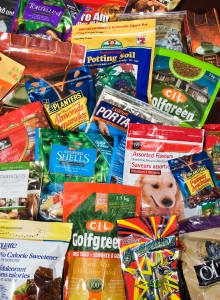
Photo by Pierre Longtin
“We were the first company to produce a reclosable pouch in Quebec back in 1993,” recalls Barillaro, who joined the company—a spin-off business of the Polypack Group—right at the outset, along with co-founding Polypack veterans Pietro Iannicca, Phil Cataldo and Alphonse D’Amore.
Located in the industrial park of Ville d’Anjou—literally across the street from the main Polypack facility—Pentaflex has certainly come along way since its early days, when it focused on providing laminating services using just a single co-solvent laminator, a Rainbow 502 model from Uteco Converting S.p.A., and a model 635 slitter from Dusenbery Converting Systems.
“Prior to Pentaflex, the company I worked for would provide laminate services for Polypack, who in turn would provide printing services for us ,” Barillaro told Canadian Packaging in a recent interview, “so when we formed Pentaflex, we already had a lot of collective experience and knowledge among us, which we could put to good use on behalf of our customers.”
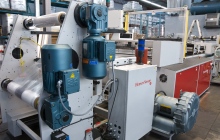
Photo by Pierre Longtin
According to Barillaro, Pentaflex got its first real taste of life in the converting industry big leagues soon after the 1993 installation of a GN 46 model pouchmaking machine, manufactured by the Mississauga, Ont.-based GN Packaging Equipment, setting the stage for continuous market growth and capacity expansion.
“The success that Pentaflex and its customers achieved with it allowed us to not only purchase a second pouchmaking machine, a GN26 model, but it also enabled us to move from our original, leased 20,000-square-foot shop into our own modern, state-of-the art, 60,000-square-foot building,” Barillaro recalls.
Today employing 135 people between them, Pentaflex and Polypack generated sales of about $35-million in 2008, according to Barillaro, and are on track to hit a $37-million sales mark this year, despite the economic slowdown.
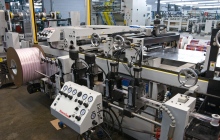
Photo by Pierre Longtin
Part of the reason for such optimism, Barillaro relates, can be traced directly to the company’s decision earlier this year to invest into the innovative Inno-Lok rollstock technology—manufactured by the Hudson-Sharp Machine Company of Green Bay, Wis.—despite some initial hesitation.
“I was familiar with the transverse pre-zippered Inno-Lok film system before we bought it,” Barillaro recounts, “but I was hesitant to produce Inno-Lok rollstock, as I wanted to focus on manufacturing pre-made reclosable pouches.”
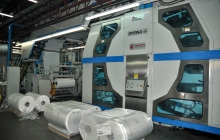
Photo by Pierre Longtin
With pouch production accounting for 60 per cent of Pentaflex’s output and rollstock for the remaining 40 per cent, the investment in Inno-Lok machinery was something of a leap of faith, according to Barillaro, but one that quickly turned out to be worth every penny.
Says Barillaro: “Prior to buying the system in January of 2009, I noticed that a lot of food-packers out there were really leaning toward utilizing film rollstock with the Inno-Lok, so I decided to purchase it.
“Today I have no regrets—the machine is already booked solid right now, and I’m now thinking of acquiring a second one.”
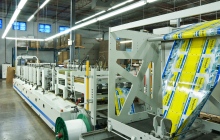
Photo by Pierre Longtin
Manufactured by Hudson-Sharp under an exclusive license of the transverse direction closure application technology originally invented by Innoflex Inc., the Inno-Lok machine employs an innovative method for attaching reclosable fasteners transversely to produce pre-zippered rolls of film that can be used across a broad range of horizontal F/F/S (form/fill/seal) packaging applications, with a slight equipment modification—mainly to allow for sufficient clearance of the zipper between the forming collar and fill tube—also enabling efficient vertical F/F/S packaging.
In basic terms, the Inno-Lok machine attaches multiple closures to the web of film, which is then rewound onto a roll so that the pre-zippered roll can then be utilized in a F/F/S machine to manufacture a high
-quality zippered package.

Photo by Pierre Longtin
According to Hudson-Sharp, the Inno-Lok technology achieves much faster processing speeds than other comparable methods—offering potential savings of up to 50 per cent in zipper material; up to 15 per cent in packaging material; and up to 20 per cent in lost scrap—while providing end-users with a higher-quality package.
Because the length of the zipper is determined by the width of the product, as opposed to the width of the package, the Inno-Lok system typically attaches the zipper only to the front wall of the package, rather than to both opposing walls, which actually reduces the amount of storage space available for a product from the same amount of packaging film.
And with the Inno-Lok zipper being pre-applied to film before it runs on an F/F/S machine, Barillaro points out, there is no additional scrap or waste for the end-user to worry about.
“It really has been a pretty darn good machine for us,” he enthuses. “My initial concern was that I didn’t want to reduce one aspect of my business for another, but I am happy to say that even with the new business brought in by Inno-Lok, my pouch department sales have not decreased in the slightest.”
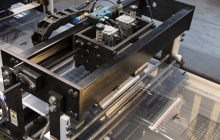
Photo by Pierre Longtin
With 75 per cent of the Pentaflex plant’s output supplied to the food industry, 15 per cent to clients in the pet-food business, and the remainder for customers in pharmaceutical and lawn-care segments, the facility naturally houses a plethora of other advanced, state-of-the-art package production and converting equipment, including:
• four Italian-built Uteco flexographic presses, specifically an Emerald 10-color press, two Emerald eight-color units and a Coral six-color machine;
• three flexographic presses manufactured by the Italian-based C & C (Carint) FLEXO Srl, including an Explorer eight-color press and two Gemini six-color units, with one stack press that can apply two-sided printing onto tubes;
• three high-speed Ritebag pouchmaking machines from the Swiss-based Waterline sa;
• one co-solvent Uteco Rainbow 502 (55-inch wide) laminator;
• one solventless 61-inch laminator from Uteco;
• three Dusenbery slitters, comprising one 635 and two 835 models.
“We’re very happy with all of our printing presses—they are all very good machines that provide us with excellent colors at very fast speeds,” Barillaro remarks.
“We don’t require four- or five-hour meetings to decide if we should purchase new equipment,” he adds.
“Because we are a proactive medium-sized company, we all agree that we should purchase a machine and then go out and inform our customers and potential customers on how they can best utilize it for their needs.”
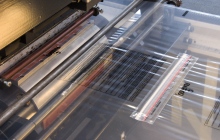
Photo by Pierre Longtin
With about 92 per cent of Pentaflex’s revenues generated in Canada, the company has not been impacted in a major way by the dollar’s relentless rise against its U.S. currency counterpart, Barillaro acknowledges, but the core reasons for its prolonged market success are rooted not in pricing but in the value-added it offers its clients through superior customer service and top-notch product quality.
“We have customers who have been with us since the inception of Pentaflex in 1992, and even some who have been with me since 1974 when I was with another company,” he states, “so we must be doing something right.
“And now we are the first company in Quebec, and to the best of my knowledge in Eastern Canada, to produce the Inno-Lok pre-zippered rollstock,” says Barillaro, noting that Pentaflex houses a fully-equipped lab on-site to test all raw materials and finished products on its premises before shipping to clients.
“At the end of the day, it all boils down to providing a high-quality product with excellent service,” Barillaro sums up.
“We’ve got a great team of people working for us here at Pentaflex and at Polypack. We’re like a big family—we give respect and we get respect,” he states. “And we parlay that internal respect into how we work with our customers.
“It’s worked very well for us so far,” Barillaro concludes, “so why would we change the way we do business?”
Advertisement

